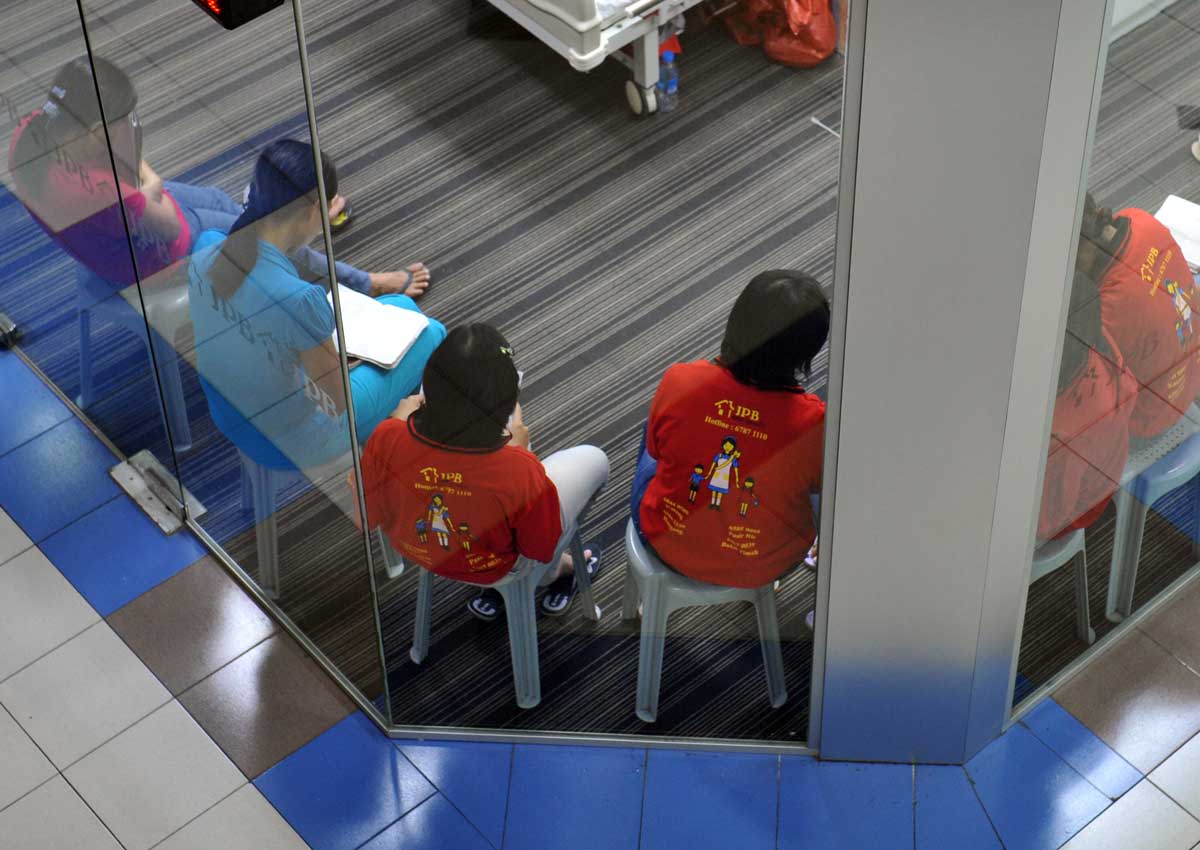With the Indonesian government declaring that it will stop sending its citizens to work as live-in maids in Singapore from next year, the possibility of Singaporeans coping without domestic helpers is once again being discussed. Insight at The Straits Times looks at how we have become dependent on maids, and whether we can cope without them.
Maids: Essential, or a luxury?
Rachel Au-yong
From a wealthy family’s substitute parent figure to the working couple’s indispensable home help, Insight looks at the changing role of the domestic helper.
When Indonesia said last month that it intended to stop sending new live-in maids abroad from as early as next year, alarm bells sounded for some employment agents and families in Singapore.
Indonesia, after all, is the biggest source of domestic helpers, with more than 125,000 women here.
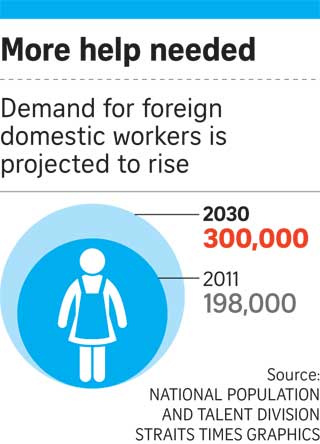 And over the years, maids have become integral to the smooth running of many Singaporean households. They pick up after the children, fetch them from school, accompany their elderly charges to the hospital and keep homes tidy, among their many roles.
And over the years, maids have become integral to the smooth running of many Singaporean households. They pick up after the children, fetch them from school, accompany their elderly charges to the hospital and keep homes tidy, among their many roles.
For adults who work irregular hours, the maids’ presence at home is a special boon. And, of course, they are relatively more affordable to employ than getting specialised home and eldercare services.
A spokesman for maid agency Express Maid says: “The salary of our helpers starts from $500 a month. It’s slightly higher than a once-a-week cleaning package, but a live-in helper can do many other things, like take care of young children.”
But others say that the Indonesian proposal has some merit, as they see some Singaporeans becoming a pampered lot.
“There are some who really need maids, especially those with sick, aged parents. But for the rest, it’s possible to do without them if you adjust expectations about neatness and work a little harder, like waking up early to make breakfast for the family,” says pastor Andy Goh, 40, a father of three.
The very nature of the relationship between maids and employers also has consequences. This includes how families and other Singaporeans – who interact with maids in homes, at neighbourhood centres and parks, and on public transport – view and regard the countries which domestic helpers come from. Countries that Singapore sources its maids from include the Philippines, Sri Lanka and Myanmar, as well as Indonesia.
And the attitude of Singaporeans towards these foreign nationals – including how such attitudes are perceived in the foreign capitals – can impact on policies.
Myanmar, which has about 30,000 maids here, has over the past two years imposed bans preventing its women from working as maids here and in Hong Kong, citing ill-treatment and abuse. The Philippines in the past has also banned citizens from being maids overseas, as has Indonesia.
Another factor in the maid equation here is households having to adjust to having a non-family member in the home – with needs to be addressed.
How did Singapore grow so reliant on maids? And can Singaporeans do without them?
FROM AMAHS TO MAIDS
From the 1930s to 1960s, employing live-in help was the domain of expatriates and wealthy local employers. This was the time of the legendary amahs, women hailing mostly from Guangdong province in China and distinctive due to their plaited hair and “uniforms” comprising white blouses and black pants.
Regarded as part of the family, they were figures of respect. Most families gave their amahs the leeway to discipline the children, allowing them to function as another “parent”.
But when Singapore industrialised from the late 1960s, more Singaporean women took up jobs in factories and offices, sparking a need for paid domestic help to look after the home.
So the Government introduced the Foreign Domestic Servant Scheme in 1978, enabling women from neighbouring countries, including the Philippines, Sri Lanka and Thailand, to be employed as paid domestic help.
From a base of about 5,000 in the late 1970s, the number has grown, and there are about 227,100 foreign domestic workers here today.
The labour force participation rate of married Singaporean women comprising citizens and permanent residents, meanwhile, has increased from 14.7 per cent in 1970 to 63.2 per cent last year.
Unlike the much-loved amahs, maids today are treated by many families as an employee who happens to live in their home, say representatives of migrant workers’ groups.
In extreme situations, some employers even install Web cameras to keep an eye on them, as is the case for a 33-year-old maid from Batia in the Philippines who wishes to be known only as Niva.
“I work from 6am to 11pm. I don’t eat meals on time and there are cameras everywhere except in the toilet. There isn’t enough freedom,” she says.
The skills required of a maid are also higher today. Some are expected to help children with ever-demanding homework and to have the computer skills to assist them; care for the elderly, which has become more complex in terms of nursing skills; and run the home, which involves operating sophisticated appliances and being able to cook according to dietary demands.
And Singaporeans get all these comparatively cheaply. The services of a live-in Indonesian maid start from $815, taking into account her salary and the monthly $265 levy, but excluding costs of insurance, food and medical care. There are levy concessions for families with young children and elderly parents.
In contrast, a bundle of specialised services – for homecooked catered meals, weekly cleaning and caregiving for the elderly or children – could easily add up to more than $2,000 a month.
Yet, vestiges of the notion of maids having a role in the family beyond that of a mere labourer continue. For example, maids do not come under the Employment Act, as the engagement of domestic labour is considered a private contract between the maid and the employer.
Furthermore, under the Employment of Foreign Manpower Act, foreign domestic workers must live with their employers at the addresses stated on their work permits.
A WAKE-UP CALL FOR SINGAPOREANS?
However, into this existing situation come the Indonesian authorities, who want their domestic workers to live separately from their employers in dormitories, work regular hours and get public holidays and days off.
The move is part of Indonesian President Joko Widodo’s plan to professionalise informal employment.
However, having domestic helpers live away from home poses logistical and financial challenges. Some worry that this defeats the purpose of hiring someone to provide ready care for aged parents or children. Others wonder if they would have to pay for accommodation and transport to and from their homes.
Some welcome the proposals, saying that Singaporeans are pampered and it is high time they learnt to cope independently.
Reader Jason Charles Ingham, in a letter to The Straits Times’ Forum page last week, noted that Singaporeans seem to be delegating the care of their children and parents to domestic helpers. “When our children cry in the middle of the night, should we, the parents, not be the ones who go to comfort them? How can we reasonably expect an employee to care for our offspring?” he asked.
Domestic helper Sheila Paspe, 29, who left the Philippines four years ago, also thinks some Singaporeans may have become overdependent: “Friends say employers can be lazy, like asking them to turn on a light in another room before they walk in,” she says.
Then there are others who are concerned about possible problems that could arise from how Singaporeans treat fellow South-east Asians who work in their homes, doing jobs that some will perceive as menial tasks.
There is also concern about the potential effect that the attitude and behaviour of parents and grandparents towards maids can have on the young. Are there those who grow up thinking that Singaporeans are superior to others from the region, non-governmental organisations (NGOs) ask.
How parents talk about the role of the helper makes all the difference, says National University of Singapore sociologist Paulin Straughan. “A lot of parents are really negligent about that. Their own prejudices flow through, which become a generalised prejudice towards people of certain countries.”
Ms Flora Sha, who manages maid agency United Channel, puts it more bluntly: “We remind our clients that maids need space to destress. We can do more to change our reputation of Singapore being a modern slave trader.”
Then again, the situation is not helped by policies like the $5,000 security bond imposed by the Ministry of Manpower, says Mr Jolovan Wham, executive director of migrant workers group Humanitarian Organisation for Migration Economics. “The bond makes you feel responsible for the workers, and so there’s this sense of ‘ownership’, not just over their labour, but also their bodies, whereabouts and who they socialise with,” he says.
Some employers speak harshly to their maids or restrict freedoms, like confiscating their phones. Others treat maids as invisible strangers, neither to be seen nor heard by the rest of the family, say NGOs.
The maids’ common complaints are about long hours, not having time off and being overworked, they add.
Several maid agents said that when mandatory days off – or payment in lieu of days off – were increased from monthly to weekly in 2013, many employers worried they could not cope.
Others feared the extra time would lead to their maids coming under the influence of the wrong crowd while out and about.
One way to improve attitudes is to recognise the skills that good domestic workers bring to the table, and compensate them accordingly, says Ms Yorelle Kalika, chief executive of Active Global Specialised Caregivers, an agency that brings in foreign home nurses. “The source countries are trying to professionalise their workforce. (They) may be more expensive than a normal maid, but it is win-win: You are getting a professional,” she says.
Over at the recently launched Centre for Domestic Employees, which is run by the National Trades Union Congress, its chairman Yeo Guat Kwang says it is working on a clearer fee structure, so Singaporean employers and maids will not be saddled with high recruitment fees, and on qualifications so higher-skilled maids get better compensation.
But Mr Yeo does not think Singapore can go without maids just yet.
“As a unionist, I am happy to see more women joining the workforce. And if it’s because of that that we need to get domestic helpers, then my job is to make sure that the employment arrangement is more transparent, and the skill set is one we can trust,” he says.
For many couples sandwiched between taking care of young children and elderly parents, having a maid is a necessity, especially when alternatives are in short supply.
Dr Lily Neo, an MP for Jalan Besar GRC, says: “We don’t have enough retirement homes, and we can’t make family members give up their jobs to take care of their parents. The elderly person falls or has a stroke – having a maid could make the difference between life and death.”
It will be difficult to become an entirely maid-less society.
Certainly, Singapore can take steps to having fewer maids, using technology and outsourcing. And this will be yet a further step away from the commanding, devoted amah who was part of the family.
rachelay@sph.com.sg
Additional reporting by Royanne Ng
See also: 10 years on, helper is very much part of family
See also: Doing without domestic help
The household: Cleaners, catering can help
Royanne Ng and Rachel Au-Yong
Apart from having them look after children and the elderly, Singapore families also rely on maids to keep their homes spick and span and to cook meals.
Even after the children have grown up or the elderly parents have died, many households still retain their maids.
How can they be weaned off the need for helpers, or at least make more efficient use of them?
ALTERNATIVE SERVICES
Using services like food catering and cleaning is one possibility.
Ms Angie Koh, director of Amahs On Wheels, a cleaning service that started in 1999, says: “There are many dual-income families with children who are grown up.
“Having a live-in helper does not really make sense for them. All they want is to come home to a clean house and ironed clothes, and we take care of that. We clean and we go.”
There are more than 20 house-cleaning services in Singapore. Ms Koh’s firm charges around $90 a cleaning session for a four-room flat in its once-a-week package.
More than 30 companies offer catered home meals. Most require customers to purchase daily meal packages for 10 to 20 days.
Food is delivered to their homes in tiffin carriers or plastic boxes.
Ms Agnes Tam, general manager of Hong Choo Catering Service, says: “Our service for meals at home has seen around a 50 per cent increase in demand compared with the last three or four years.”
According to Ms Tam, many families use the service even though they have maids.
“The family can get tired of eating the same kind of food every day, or the food the helper cooks may not suit their taste,” she says.
TECHNOLOGY
Today, many household items have also tapped technology to lessen the burden of housekeeping.
Take robotic vacuum cleaners.
With inbuilt sensors, these automatic cleaners navigate obstacles in the house while picking up dirt.
Smart refrigerators and ovens can remind owners to stock up on items, display recipes and tell them when the food is ready.
Pet owners can use automatic pet feeders, which allow their animals to take the right amount of food on time without human supervision.
RELAX MAID REGULATIONS?
Now, a maid can work only at the residential address stated in her work permit. She is not allowed to take on any part-time work.
But some employers argue that such a system is not an efficient use of manpower. Despite the penalties, a black market of moonlighting maids exists.
An educator in her 50s, who hires her sister’s Indonesian maid to clean her house once a week for $40 to $50 each time, says: “Both my sister and I live with just our husbands as the kids have moved out.
“So her maid has a lot less to tidy up now, and fewer people to cook for. Plus she knows me, so why can’t she help?
“I understand it’s about protecting the helpers, but couldn’t contracts be expanded to include multiple families?”
Childcare: Teach life skills, tap community for help
Rachel Au-Yong and Royanne Ng
About 70 per cent of married couples where the husband is aged 35 to 49 earn dual incomes. Here are ways such couples with children can manage without a live-in maid.
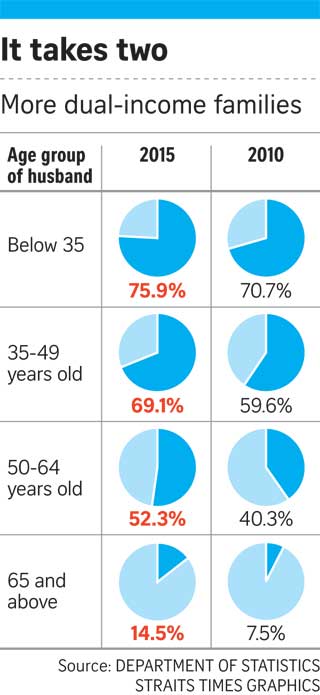 NURTURING LIFE SKILLS
NURTURING LIFE SKILLS
In 2011, there was an uproar when a photo of a maid carrying an army recruit’s pack went viral online.
It sparked debate about a softer generation of Singaporeans, who are waited on hand and foot. Posters argued this made the young less resilient and independent.
One way around this is to lay down ground rules early. Human resource manager Shauna Lin, 39, says her daughters, aged six and nine, have to make their own beds and wipe their worktables. She and her husband, a 42-year-old lawyer, engage a part-time cleaner twice a week.
“We don’t want our girls to grow up spoilt,” she says. “The same rules apply when we visit friends with maids. The older girl knows she has to at least offer to take the dirty dishes to the kitchen.”
OLDER NANNIES
Companies providing babysitting services boast that their nannies are more experienced and culturally aligned than maids, because most are older women from Singapore or Malaysia.
“There are few cultural differences and no language barriers. Most of our nannies are grandparents themselves, so they know how to take care of children. A lot of maids are in their 20s, so they might not have enough experience,” says Mr Alex Chua, who owns Super Nanny.
Nanny services do not come cheap, and most companies stress that their employees do not do housework.
Mr Chua says his clients – about 80 per cent of whom are Singaporean – pay about $2,300 a month for both daycare and 24-hour care services. Mr Adrian Ng of BBNanny says monthly fees range from $800 to $1,650, depending on length of service required and the child’s age.
In contrast, monthly wages for a maid start at $450 if she is a new hire from Myanmar.
Mr Chua hopes that the Ministry of Manpower can relax the rules covering Malaysian nannies, who make up about 80 per cent of his staff. Eligible Malaysians work as confinement nannies only until the child is 16 weeks old.
“Some mothers need help looking after children who are six months to a year old,” says Mr Chua. “The parents might have health problems, or just need an extra hand, but our hands are tied.”
TURNING TO NEIGHBOURS
One of the buzzwords that MPs, grassroots leaders and academics have been throwing about in recent years is “gotong royong”, or community spirit. When it comes to childcare, why not turn to neighbours – retirees with zest or stay-at-home mothers looking for extra income?
National University of Singapore sociologist Paulin Straughan says that while the Government could do more to plug the gaps in childcare services, it is time to “bring back the kampung spirit and have people provide mutual support”.
Retirees could tap their $500 SkillsFuture allowance to keep up to date on childcare, she notes.
Management assistant officer Clara Hong, 45, looked among her neighbours to find a nanny for her children 18 years ago. She made fliers and dropped them into mailboxes. A woman who lived a block away became her daughter’s nanny, and she found a nanny for her son just next door.
Eldercare: More home and daycare services
Rachel Au-yong
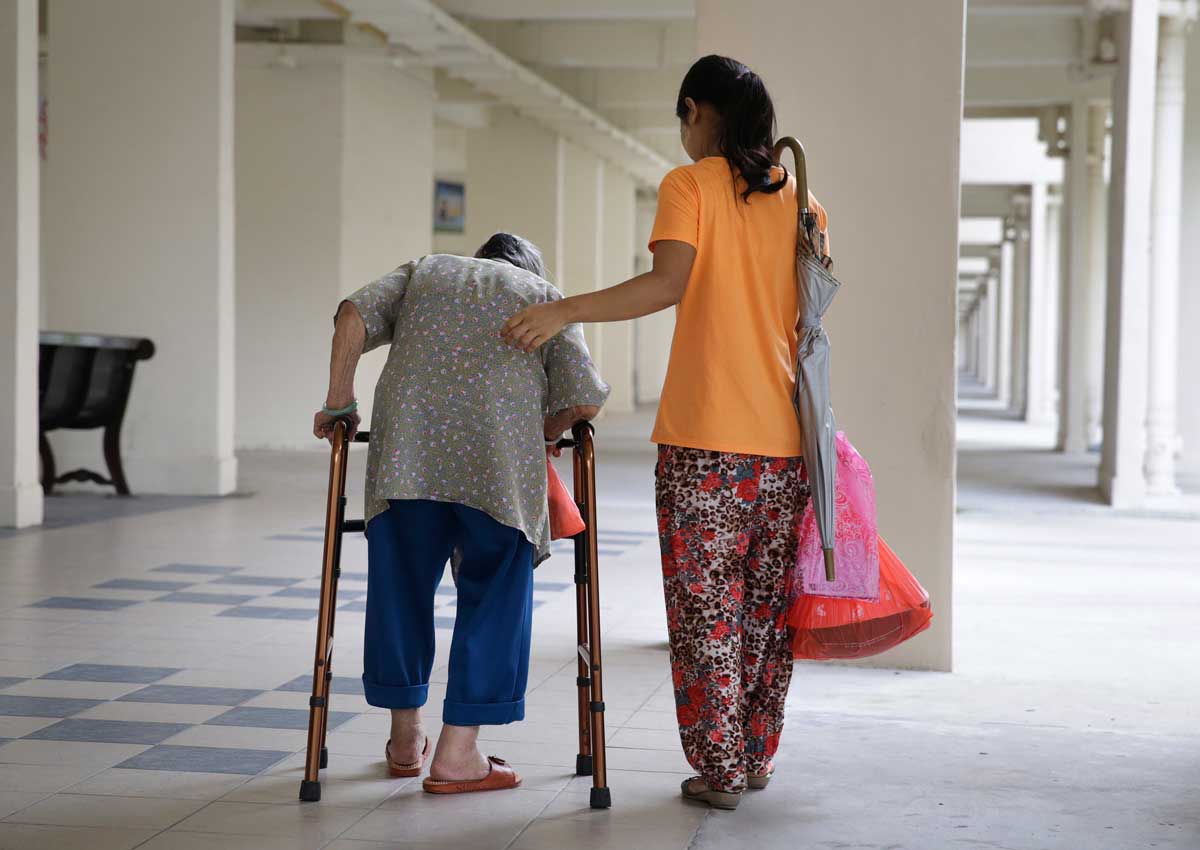
Nearly one in three people in Singapore will require some form of eldercare by 2030. There will be a need for more facilities and healthcare workers, but robotics and smart home technology could offer solutions too.
Or how about an Uber-like service to tap nurses, caregivers? Robots are an idea too
Walk into a hospital on a weekday and it won’t be long before you see a domestic worker pushing her elderly charge in a wheelchair to his next appointment.
Several employment agents The Sunday Times spoke to say that up to 70 per cent of the Singapore families who hire maids do so because they need help taking care of ageing parents.
For adult children who live in a different house or work late, having a maid to keep an eye on their ageing parents brings some peace of mind. So what alternatives are there?
HOME CARE AND DAYCARE SERVICES
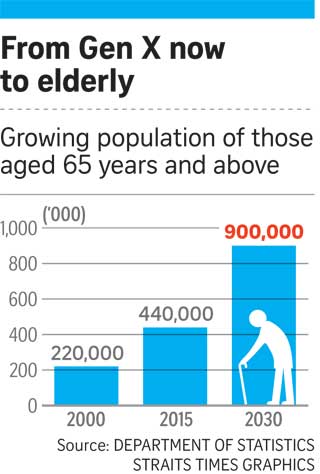 Options include community-based home care and daycare services, which the Government is encouraging to ease the rising need for hospital and nursing home beds.
Options include community-based home care and daycare services, which the Government is encouraging to ease the rising need for hospital and nursing home beds.
Home care services range from someone hired to prepare meals, to a physiotherapist who assists with physical rehabilitation, to a nurse who can change urinary catheters or feeding tubes – all in the elderly person’s own home.
On the Singapore Silver Pages website by the Agency for Integrated Care, home care services that provide personal care such as personal hygiene, assistance with medication and simple maintenance exercises range from $22 to $30 an hour, while medical visits start at $140 per session, all before subsidies. Eligible clients enjoy up to 80 per cent in government subsidies.
Daycare services are provided at integrated facilities that not only give seniors a chance to interact, but also offer services such as community nursing and rehabilitation in one location. Elderly clients return to their own homes in the evening. Prices can range from $250 to $600 a month, before subsidies.
However, such facilities are in short supply. In April, MP Lily Neo (Jalan Besar GRC) even went so far as to say in Parliament that “our home care services are almost non-existent at present”.
As for daycare spots, there are only 3,500 – a figure that the Government is pushing to increase. By 2030, almost a million people will be above 60. Nearly one in three people will need some form of eldercare service by then.
Another problem is the lack of healthcare workers and caregivers in the eldercare sector.
Speaker of Parliament Halimah Yacob, an MP for Marsiling-Yew Tee GRC, says more should be done to attract Singaporeans to work in the eldercare sector. She suggests that the Government set up a central employment agency to recruit and train staff and plan their career development.
The eldercare sector’s negative image also needs to change, she says, noting “low wages and a lack of career opportunities as it is largely dominated by VWOs (voluntary welfare organisations)”.
She adds: “As more foreigners are employed in this sector, it further reinforces the negative image that this is not an exciting sector to join.”
Meanwhile, the private sector can be tapped as well, to help with eldercare in sometimes less obvious ways.
For example, already there are several companies marketing wearable panic buttons that elderly users can press to alert their family members if they fall.
And with the silver market expected to expand, from $9 billion in 2014 to $16 billion by 2030, what is stopping enterprising entrepreneurs from creating the eldercare equivalent of Uber (a private-hire car firm) for nurses or caregivers?
ROBOTICS AND TECHNOLOGY
Technology is another area that Singapore can examine to reduce the reliance on maids for eldercare.
Foreign Affairs Minister Vivian Balakrishnan said during a visit to Japan in April that it was worth studying how that country had extensively used robotics in nursing and caring for senior citizens.
Japan is an ageing country – those over 65 are expected to make up 40 per cent of its population by 2060 – and also has strict immigration laws, so it is delving into the world of robotics to find solutions.
For example, Japanese firm Cyberdyne produces mechanical limbs and “exoskeletons” – wearable machines that support a user, giving them mobility and strength – for patients with spinal difficulties. Such devices could allow frail seniors to take care of themselves.
And certainly, in Singapore, the Government has shown an eagerness to embrace technology with its Smart Nation drive.
It has also earmarked more than $450 million for the National Robotics Programme over the next three years, to help firms adopt robotics technology and boost productivity.
Already, the Housing Board and the Health Ministry have initiated pilot projects to develop and install elderly monitoring systems in flats occupied by lone elderly residents. These systems can monitor residents’ activity levels and trigger an alert to a caregiver, for instance, when there is extended non-movement, which could point to a fall.
Dr Tan Hwee Pink, an associate professor of information systems at Singapore Management University, says the next step is to find a way to have eldercare technology run seamlessly with other home automation systems, so as not to overload the user with too many systems.
His goal in the meantime? “To ensure that technology does not replace, but triggers when needed, the human touch, as with a live-in maid, so the elderly can still enjoy their privacy (by living in their own home).”
rachelay@sph.com.sg
See also: 10 years on, helper is very much part of family
See also: Doing without domestic help

This article was first published on June 5, 2016.
Get a copy of The Straits Times or go to straitstimes.com for more stories.
